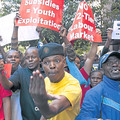
Liberate thoughts from structured debate
There are two dominant spheres in contemporary South African youth politics. The first is a largely middle-class sphere whose points of political engagement are informed by the mainstream media and online platforms.
Here, you largely find debates which titillate an educated class that believes it is part of a broad civic intellectual culture. This sphere is mostly confined to the economic elite and driven by a narcissistic individualism cultivated by our former Model C and private schools system, which instils a belief in pupils that they are natural leaders destined to be the most important voices in society.
The pinnacle of achievement in this sphere is the creation of a personal brand, media profile and fame — and perhaps an appearance on some top young people list. There are no new political insights to be found here, political conversations regurgitate the mainstream media cycle.
The second sphere is what I crudely termed the "mass populism domain", which is dominated by ANC alliance structures. Political engagement is largely treated as a mass mobilisation affair or internal party concern. This is the sphere of Floyd Shivambu and Julius Malema, in which the majority of politically interested students, pupils and unemployed youth are located.
Here, issues are framed in a hodge-podge of Marxism, African traditionalism, African nationalism, non-racialism, Pan-Africanism, and government bureaucratic speak. More and more, the aim of this sphere is to discourage pointed questioning of the ANC's current malaise and the deep flaws of its individual leaders.
In-between these two political spheres there exists a very small space where the possibility of a more independent youth public politics may emerge. But does this space exist or is it mere a possibility'? It exists, but barely. We see youth-led groups in townships, informal settlements, rural areas rejecting partisan politics in favour of locally informed concerns.
We see black-driven middle-class campus groups organising critical dialogue spaces; gender and sexuality campaigns criticising elitism in their own political communities; privileged suburban children volunteering, teaching, tutoring without drawing attention to themselves or assuming intellectual leadership over the poor; and circles of poets, hip-hop heads and tavern intellectuals who discuss political theory over a quart of beer.
What they all have in common is a strong understanding of African emancipatory traditions and some desire to critically adapt them for today's community concerns. But this public sphere is tiny. The problem is one of imagination.
Post-apartheid youth, regardless of partisanship, have not yet seen that we must create a new intellectual tradition from scratch. Liberation traditions evolved in the context in which "capturing" the state was the end goal.
However, the "capture" has spawned a litany of failures by African leaders who refuse to give people genuine democratic power. Thus, while we have a political language of "capture", we have yet to institutionalise accountability. We talk of dismantling "white monopoly capital" by "socialising the means of production", but there's little emphasis on how to "democratise the means of state and fiscal administration" which have been captured by our liberation movements.
The intellectual work is necessary; we must do it on our own terms for our own sakes. Frustrated young people complain: But we talk too much, we need to act. I disagree with this notion; of importance is what you are talking about, who set the agenda and who does most of the talking.
Within the non-governmental and volunteer sector we regularly see well-intentioned people doing a great many things to help. Yet, their models of action are questionable and at worst, downright self-serving and exploitative.
Furthermore, dissent is often shut down by the government when it tells us to stop complaining and come up with practical and constructive suggestions to problems. In reality, some of the best ideas come out of fearless disagreement. There is no need to look far; the rich traditions of debate in the ANC and the Black Consciousness Movement attest to centrality of engaged intellectualism to political action.
There can be no credible politics without credible ideas. Mkhize is a history lecturer at Rhodes University.
Caption: MAKING THEIR POINT: The politicised youth of South Africa broadly fall into two camps, those who are middle class and those directly involved in party structures
Photo by: Martin Rhodes
By: Nomalanga Mkhize
Source: The Sowetan
